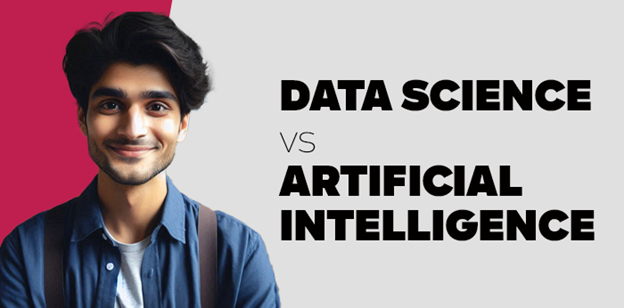
Data Science and AI are two closely linked but separate fields that have brought about significant transformations in industries across the globe. Data Science is all about extracting valuable insights from large datasets, while AI is focused on developing intelligent systems that can perform tasks typically done by humans. Both fields rely on data and utilise machine learning, but they each have distinct objectives and approaches. This article explores the fundamental distinctions, parallels, job opportunities, and necessary proficiencies needed for each domain.
Join 100% Online Degree programs UGC Entitled and Affordable
In the context of this discussion, the term “data science” refers to the process of extracting useful information from vast amounts of data. Using statistical analysis, computer science, and years of expertise in the field, it is able to uncover patterns and trends that were previously hidden from view. In order to solve complex problems, give information that can be used to guide decision-making, and drive innovation across a range of industries, including retail, healthcare, and finance, data scientists are responsible for cleaning, examining, modeling, and visualizing data. As a result, they are able to solve complex problems.
Artificial Intelligence (AI) is a fascinating field within computer science that involves the creation of intelligent agents. These agents can perceive their surroundings, learn from their experiences, make logical deductions, and take actions to accomplish specific objectives. It’s truly remarkable how AI technology continues to advance and shape our world. AI is transforming various industries, bringing advancements in areas such as self-driving cars and medical diagnosis. Machine learning, a subset of AI, allows systems to learn from data without the need for explicit programming. This technology has led to significant advancements in areas such as image recognition, natural language processing, and predictive analytics. The potential of AI is immense, with wide-ranging implications for various industries, including healthcare, finance, entertainment, and education. As AI continues to evolve, it is essential to prioritize ethical considerations and responsible development.
|
Feature |
Artificial Intelligence (AI) |
Data Science |
|
Focus |
Create intelligent machines that can mimic human capabilities |
Extract knowledge and insights from data |
|
Goal |
Achieve human-like intelligence in computer systems |
Uncover hidden patterns, trends and relationships within data |
|
Methods |
Machine learning, deep learning, natural language processing |
Statistics, data analysis, machine learning |
|
Applications |
Self-driving cars, facial recognition, virtual assistants |
Fraud detection, risk assessment, customer segmentation |
|
Examples |
AlphaGo (game playing), Alexa (virtual assistant) |
Recommendation systems, credit scoring models |
Data Science and Artificial Intelligence (AI) have a strong connection and work together harmoniously, sharing numerous similarities. Both fields rely heavily on data to drive innovation and guide decision-making.
Data Science Career Prospects
Data Science involves extracting valuable insights from massive datasets. Professionals in this field are responsible for collecting, cleaning, analyzing, and visualizing data to solve complex problems.
Key roles in Data Science:
Industries Hiring Data Scientists:
Artificial Intelligence focuses on creating intelligent agents capable of performing tasks that typically require human intelligence. It involves developing algorithms and systems that can learn and adapt.
Key roles in AI:
Industries Hiring AI Professionals:
|
Job Title |
Field |
Average Base Salary (INR)* |
|
Data Scientist |
Data Science |
₹8,00,000 – ₹20,00,000 |
|
Data Analyst |
Data Science |
₹5,00,000 – ₹12,00,000 |
|
Data Engineer |
Data Science |
₹7,00,000 – ₹15,00,000 |
|
Machine Learning Engineer |
AI |
₹8,50,000 – ₹22,00,000 |
|
AI Researcher |
AI |
₹10,00,000 – ₹25,00,000 |
|
AI Engineer |
AI |
₹8,00,000 – ₹20,00,000 |
|
NLP Engineer |
AI |
₹7,50,000 – ₹18,00,000 |
Essential Skills for Data Science
Data Science involves extracting meaningful insights from large datasets. To excel in this field, professionals need a strong foundation in:
Essential Skills for Artificial Intelligence
AI focuses on creating intelligent agents capable of performing tasks that typically require human intelligence. Key skills for AI professionals include:
Both artificial intelligence and data science provide good employment opportunities, with competitive demand and pay. It depends on your interests, talents, and professional objectives as to which field is the most suitable for you.
Choose Data Science if:
Choose AI if:
Data Science and AI are related but different topics that are changing businesses globally. Data science seeks insights from data, whereas AI seeks to construct intelligent computers that can do human-like jobs. Both need high arithmetic, statistics, and programming skills, but their applications differ. Undoubtedly, these sectors work together. Data science powers AI, while AI improves data science. Technology will increase demand for workers with both skills. The future belongs to those who use data and AI to innovate and tackle complicated problems.
Amrita AHEAD, Amrita Vishwa Vidyapeetham provides the artificial Intelligence (AI) course in both MBA and MCA.
You May Also Like: